2023年中考英语语法归纳 形容词和副词 课件(共43张PPT)
文档属性
| 名称 | 2023年中考英语语法归纳 形容词和副词 课件(共43张PPT) |  | |
| 格式 | zip | ||
| 文件大小 | 112.7KB | ||
| 资源类型 | 教案 | ||
| 版本资源 | 人教新目标(Go for it)版 | ||
| 科目 | 英语 | ||
| 更新时间 | 2022-07-28 08:44:43 | ||
图片预览

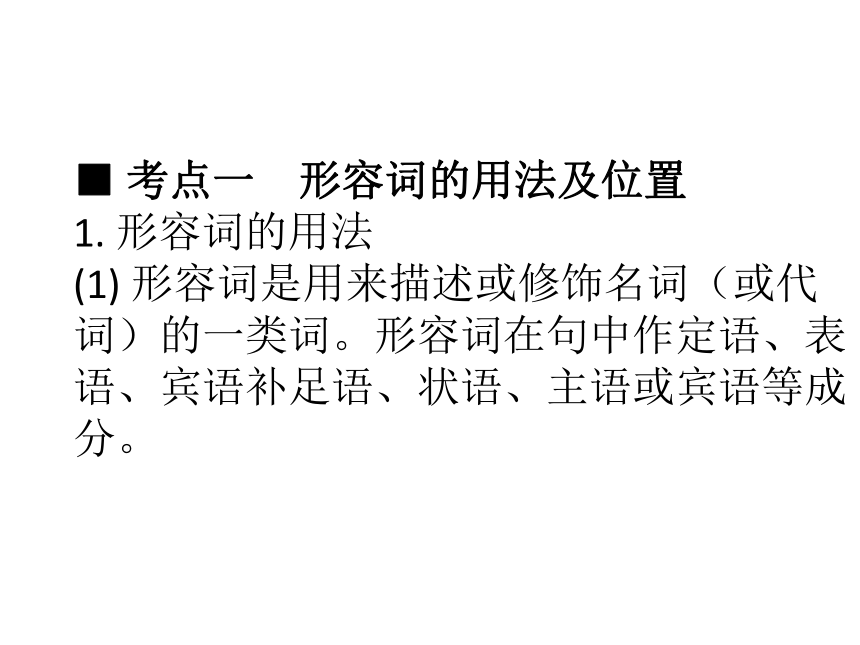
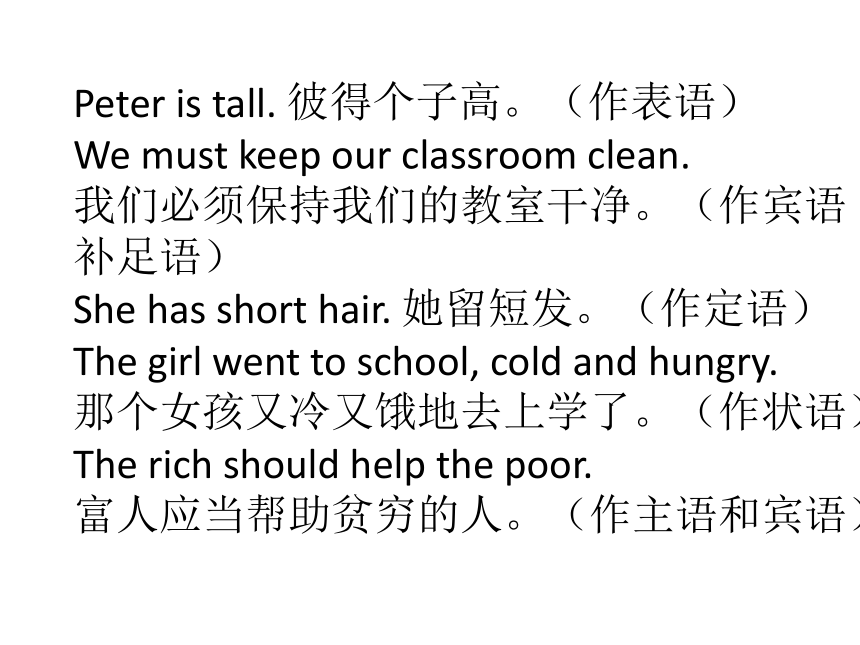
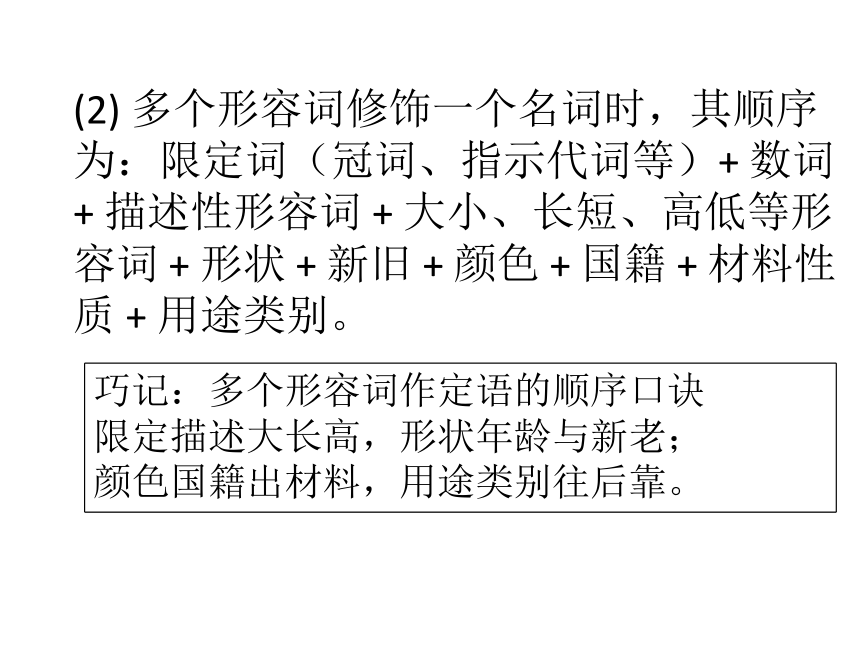

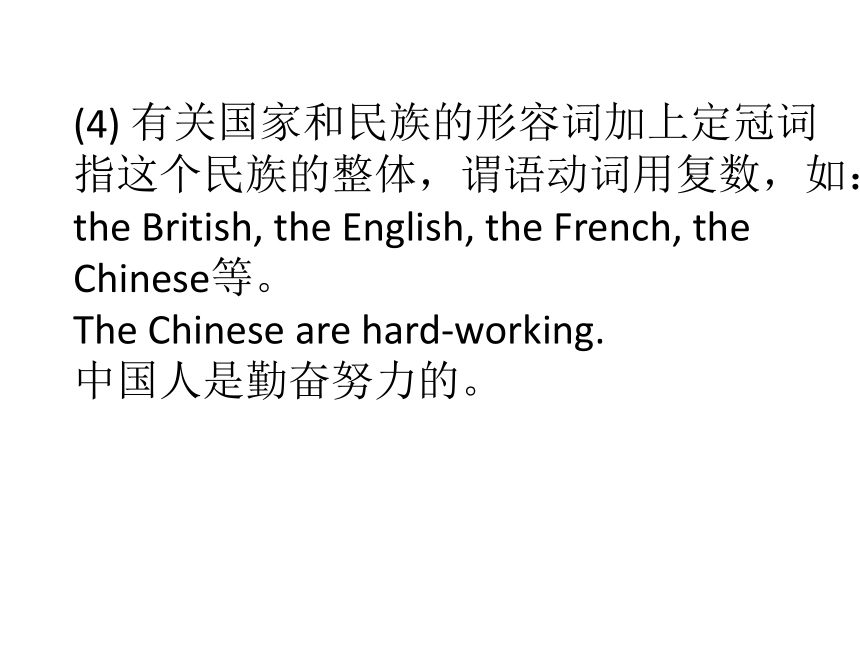
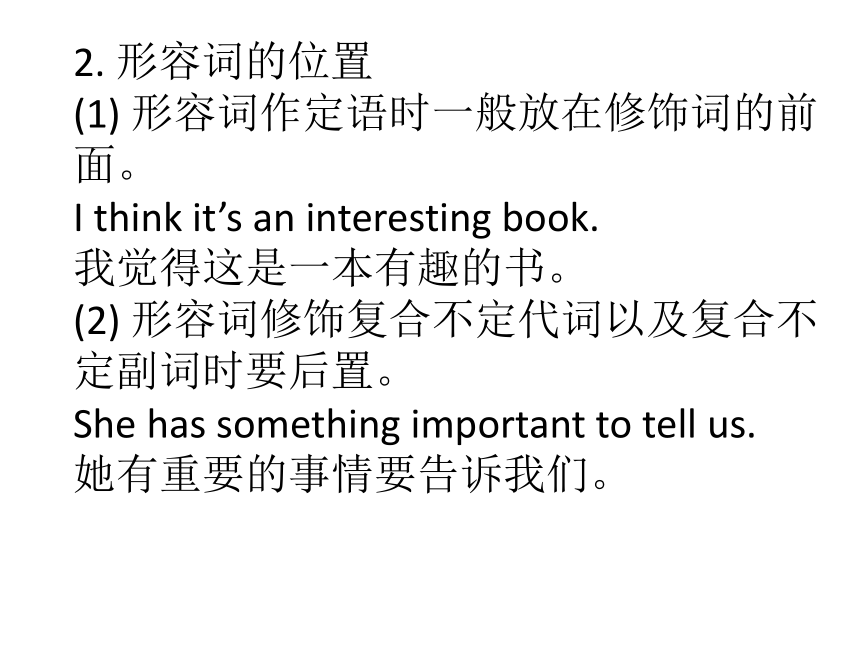

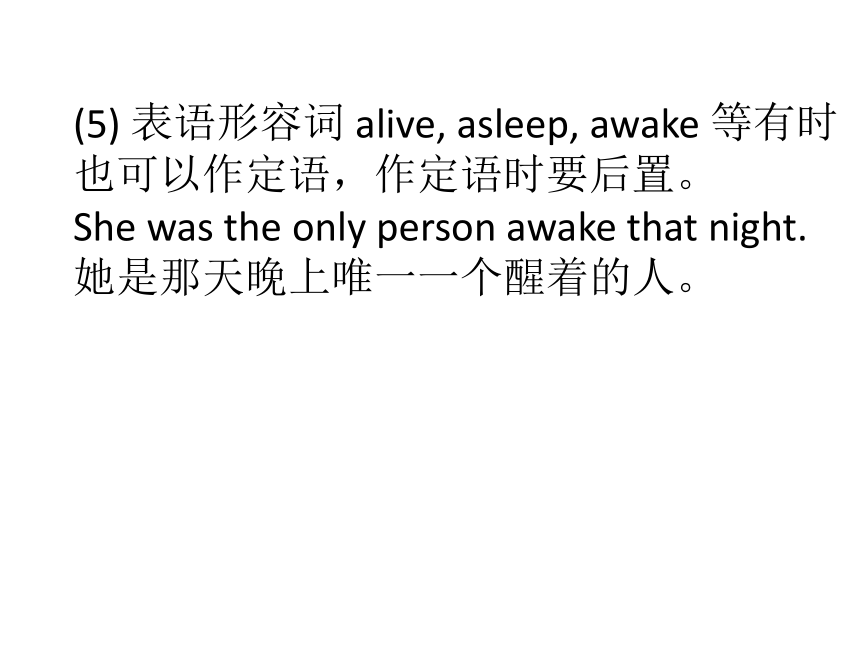
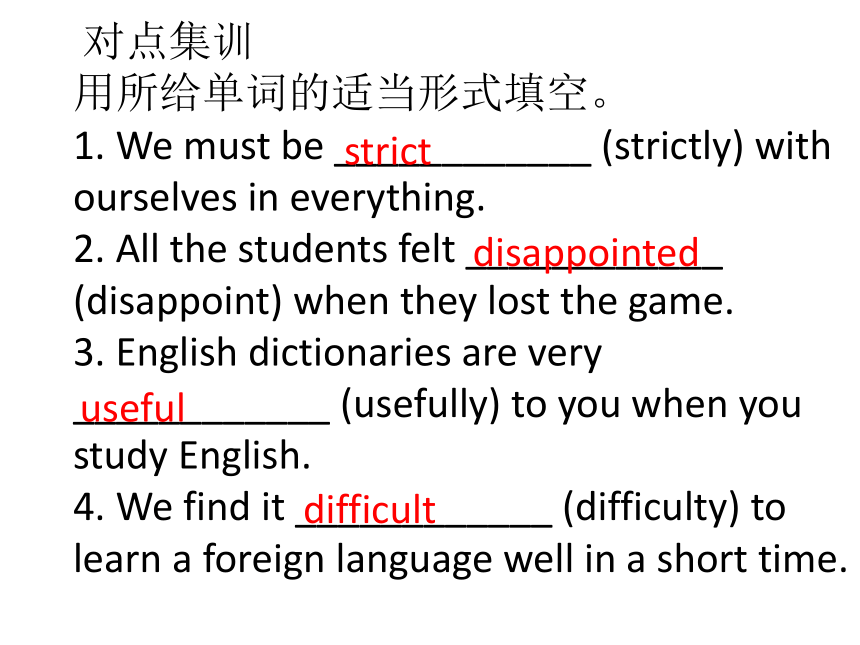
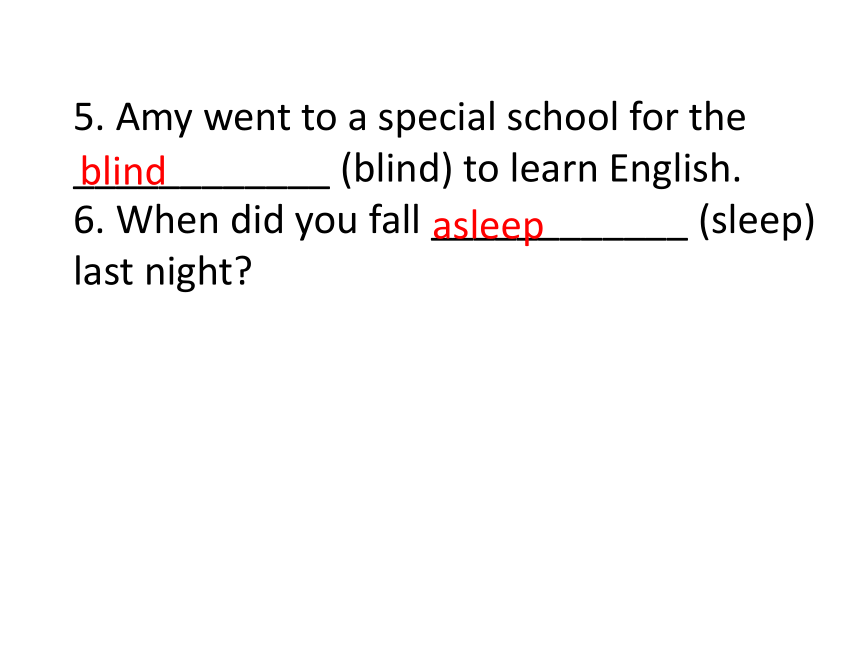
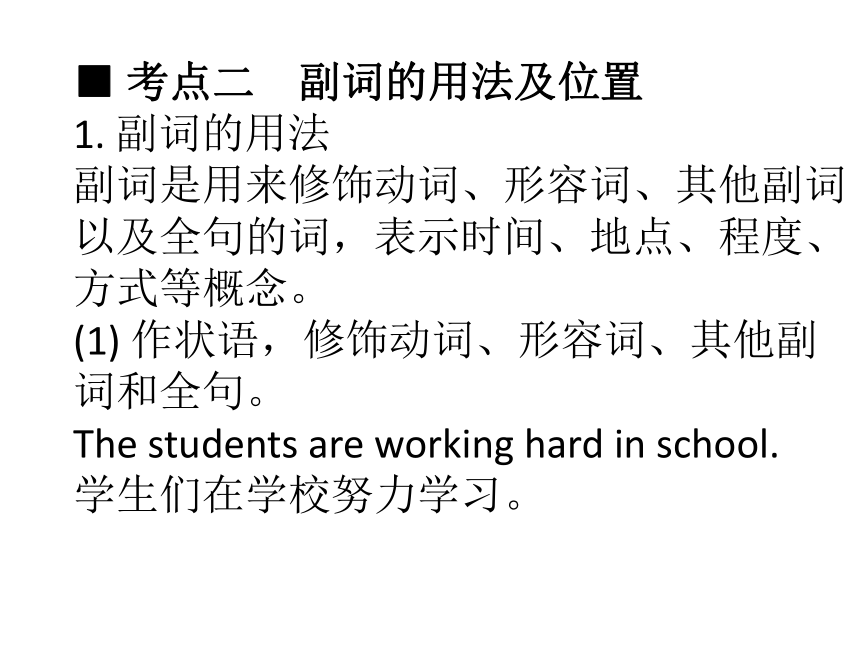
文档简介
(共43张PPT)
中考英语语法归纳
形容词和副词
九年级英语备课组
■ 考点一 形容词的用法及位置
1. 形容词的用法
(1) 形容词是用来描述或修饰名词(或代词)的一类词。形容词在句中作定语、表语、宾语补足语、状语、主语或宾语等成分。
Peter is tall. 彼得个子高。(作表语)
We must keep our classroom clean.
我们必须保持我们的教室干净。(作宾语补足语)
She has short hair. 她留短发。(作定语)
The girl went to school, cold and hungry.
那个女孩又冷又饿地去上学了。(作状语)
The rich should help the poor.
富人应当帮助贫穷的人。(作主语和宾语)
(2) 多个形容词修饰一个名词时,其顺序为:限定词(冠词、指示代词等)+ 数词 + 描述性形容词 + 大小、长短、高低等形容词 + 形状 + 新旧 + 颜色 + 国籍 + 材料性质 + 用途类别。
巧记:多个形容词作定语的顺序口诀
限定描述大长高,形状年龄与新老;
颜色国籍出材料,用途类别往后靠。
a small round table 一张小圆桌
a dirty old brown shirt
一件又脏又旧的棕色衬衣
(3) 某些形容词加上定冠词可以泛指一类人,谓语动词用复数,如:the dead, the living, the rich, the poor, the blind 等。
The poor are in great need of help.
穷人们非常需要帮助。
(4) 有关国家和民族的形容词加上定冠词指这个民族的整体,谓语动词用复数,如:the British, the English, the French, the Chinese等。
The Chinese are hard-working.
中国人是勤奋努力的。
2. 形容词的位置
(1) 形容词作定语时一般放在修饰词的前面。
I think it’s an interesting book.
我觉得这是一本有趣的书。
(2) 形容词修饰复合不定代词以及复合不定副词时要后置。
She has something important to tell us.
她有重要的事情要告诉我们。
(3) 形容词与数量词连用作定语时,形容词要后置。
The room is four metres long and three metres wide.
这个房间4米长,3米宽。
(4) 形容词短语作定语时,要后置。
This is a lake famous for its scenery.
这是一个以风景闻名的湖泊。
(5) 表语形容词 alive, asleep, awake 等有时也可以作定语,作定语时要后置。
She was the only person awake that night.
她是那天晚上唯一一个醒着的人。
对点集训
用所给单词的适当形式填空。
1. We must be ____________ (strictly) with ourselves in everything.
2. All the students felt ____________ (disappoint) when they lost the game.
3. English dictionaries are very ____________ (usefully) to you when you study English.
4. We find it ____________ (difficulty) to learn a foreign language well in a short time.
strict
disappointed
useful
difficult
5. Amy went to a special school for the ____________ (blind) to learn English.
6. When did you fall ____________ (sleep) last night
blind
asleep
■ 考点二 副词的用法及位置
1. 副词的用法
副词是用来修饰动词、形容词、其他副词以及全句的词,表示时间、地点、程度、方式等概念。
(1) 作状语,修饰动词、形容词、其他副词和全句。
The students are working hard in school.
学生们在学校努力学习。
(2) 作表语,多数与介词同形的副词以及一些表示位置的副词都可以用作表语。
I’m afraid I must be off now.
恐怕我现在得走了。
(3) 作宾语补足语。
I saw him out just now. 刚才我看见他出去了。
(4) 作定语。
The people here are hard-working.
这里的人们是勤奋努力的。
2. 副词的位置
(1) 修饰动词,多数位于动词之后,及物动词的宾语之后。
She speaks English well. 她英语说得很好。
(2) 频度副词(always, never, often等)通常放在行为动词之前,情态动词、be动词、助动词之后。但是sometimes 位置较灵活,还可以放在句子的开头和结尾。
My sister sometimes has lunch at school.
= Sometimes my sister has lunch at school.
= My sister has lunch at school sometimes.
我姐姐有时候在学校吃午饭。
(3) 修饰形容词或副词,放在被修饰词之前。
He has a very nice watch.
他有一块非常漂亮的手表。
(4) 作表语,放在系动词后。
She is out at the moment. 此刻她在外面。
(5) 作宾语补足语,放在宾语之后。
Please have them in. 请让他们进来。
(6) 修饰全句,放在句首。
Perhaps/Maybe he’s watching TV at home.
也许他正在家里看电视。
(7) enough 修饰形容词或副词放在形容词、副词之后。
He is old enough to go to school.
他足够大了能去上学了。
(8) 表示时间或地点的副词多位于句末,当它们在一个句中时,通常地点副词在前,时间副词在后。但若表示强调也可以置于句首。
We went shopping in the supermarket at 9 o’clock yesterday.
昨天九点钟我们去超市买东西了。
Nowadays many young people dream of studying abroad.
现在很多年轻人梦想出国留学。
对点集训
用合适的单词或所给单词的适当形式填空。
1. Jack didn’t come to school because he was ____________ (bad) ill.
2. It’s one o’clock, but his mother hasn’t come back ____________.
3. ____________ (luck), they escaped from the burning building.
4. Miss Zhou ____________ (usual) rides a bike to work. Riding keeps her thin and fit.
badly
yet
Luckily
usually
5. The cat is very old. She can’t run ____________ (quick).
quickly
■ 考点三 形容词与副词的用法比较
形容词和副词在用法上极易混淆,特别是那些词形相同的形容词和副词。下面从它们的作用、位置和句子中的谓语动词上来比较一下。
1. 从作用上比较
形容词在句中主要修饰名词或代词,用作定语;而副词主要在句中修饰动词、形容词、其他副词或整个句子,用作状语。
We hope for an early answer.
我们希望早日得到答复。(句中 early 作形容词,修饰名词)
I get up early every day.
我每天都起得很早。(句中 early 作副词,修饰动词)
2. 从在句中的位置上比较
形容词主要用于修饰名词,置于名词前,也可以修饰复合不定代词,置于复合不定代词之后。而副词主要用于修饰形容词或其他副词,一般放在形容词或其他副词之前。
He is too young to move the heavy box.
他太小了以至于搬不动这个重箱子。
I have something important to tell you.
我有重要的事情要告诉你。
This box is very heavy. 这个箱子很重。
He speaks English quite well. 他英语说得相当好。
3. 从句中的谓语动词上比较
根据句子中使用的谓语动词可以判断出是该用形容词还是该用副词。如果谓语动词是连系动词,则后面应用形容词作表语,不能用副词;如果谓语动词是行为动词,那后面一定要用副词修饰动词。
The cup of coffee smells good.
这杯咖啡闻起来很香。
Jim’s mother looks at him happily and looks happy.
吉姆的妈妈开心地看着他,看上去很高兴。
■ 考点四 形容词、副词的比较级与最高级
1. 构成
(1) 规则变化
构成 原级 比较级 最高级
一般单音节词末尾加 -er,-est tall taller tallest
以不发音的字母 e 结尾的单音节词只加 -r,-st nice nicer nicest
以一个辅音字母结尾的重读闭音节单词,双写末尾的辅音字母,再加 -er,-est big bigger biggest
“以辅音字母 + y”结尾的双音节词,改 y 为 i,再加 -er,-est busy busier busiest
部分双音节词和多音节词,在前面加 more,most 来构成比较级和最高级 important more important most important
(2) 不规则变化
原级 比较级 最高级
good/well better best
bad/badly/ill worse worst
much/many more most
little less least
far farther/further farthest/furthest
2. 用法
(1) 形容词比较等级的用法
比较等级 用法 例句
原级 肯定句中用“as + 形容词原级 + as ...”结构 My handwriting is as beautiful as yours.
我的书法和你的一样好。
否定句中用“not as/so + 形容词原级 + as ...”结构 Lily is not as/so tall as Mary.
莉莉没有玛丽高。
比较级 两者之间的比较用“形容词比较级 + than” You look much younger than I do.
你看上去比我年轻多了。
两者比较也可以用“the + 比较级 + of 短语(比较范围)”,表示“两者中较……的那一个” It is the narrower of the two streets.
这是两条街道中比较窄的一条。
比较级 “比较级 + and + 比较级”或“more and more + 形容词原级”,表示“越来越……” Our country is getting stronger and stronger.
我们的国家正变得越来越强大。
Our hometown is becoming more and more beautiful.
我们的家乡正变得越来越美丽。
比较级 “the + 比较级 ..., the + 比较级 ...”表示“越……,就越……” The more difficult the problem is, the more careful we should be.
问题越难,我们就越应小心。
最高级 the + 形容词最高级 + 名词 + 表示范围的短语或从句 Luke is the fastest runner of the three boys.
鲁克是这三个男孩中跑得最快的。
最高级 one of the + 最高级,表示“最……之一” Qingdao is one of the most beautiful cities in China.
青岛是中国最美丽的城市之一。
最高级 “形容词比较级 + than + any other + 单数名词/anyone else/anything else”表示最高级 Tom is taller than any other boy in his class.
汤姆比他班上任何其他男生都高。
Time is more valuable than anything else.
时间是最珍贵的东西。
(2) 副词比较等级的用法
比较等级 用法 例句
原级 肯定句中用“as + 副词原级 + as ...”结构 I love music as much as Betty does.
我和贝蒂一样喜欢音乐。
否定句中用“not as/so + 副词原级 + as ...”结构 She can’t use the computer so/as well as you.
她计算机没有你运用得好。
原级 用“... times + as + 副词原级 + as ...”的形式表示倍数 This car runs three times as fast as that one.
这辆车的行驶速度是那辆车的三倍。
比较级 “副词的比较级 + than”句式 She comes here less often than before.
她不如以前经常来这里了。
比较级 “no + 比较级 + than ... ”和 “not + 比较级 + than ...”句式 John speaks Chinese no more fluently than his younger brother.
约翰汉语说得不如他弟弟那样流畅。
比较级 “比较级 + and + 比较级”或“more and more + 副词原级”表示“越来越……” With the teacher’s help, I can speak English better and better.
在老师的帮助下,我英语讲得越来越好了。
She plays the piano more and more beautifully.
她钢琴弹得越来越好。
比较级 “the + 比较级 ..., the + 比较级 ...”句式 The harder you work, the better you will learn.
你越努力,学得就会越好。
最高级 (the) + 副词最高级 + 表示范围的短语或从句 He talks (the) least and does (the) most in his class.
他是班上说得最少干得最多的人。
对点集训
I. 写出下列单词的比较级和最高级。
1. good ____________________
2. fat ______________________
3. little _____________________
4. bad _____________________
5. busy _____________________
6. beautiful _________________
7. fast ______________________
8. importantly _______________
better – best
fatter – fattest
less – least
worse – worst
busier – busiest
more beautiful – most beautiful
faster – fastest
more importantly – most importantly
9. late ______________________
10. far ______________________
later – latest
farther - further
II. 用所给单词的适当形式填空。
1. Henry is as ____________ (strongly) as his father.
2. Of all the books, I like this one ____________ (well).
3. My brother is two years ____________ (old) than me.
4. Which subject is _______________ (difficult), Maths, Physics or English
5. Lily didn’t write so ____________ (careful) as her deskmate.
strong
best
older
the most difficult
carefully
6. I usually get up ____________ (early) than my father.
earlier
中考英语语法归纳
形容词和副词
九年级英语备课组
■ 考点一 形容词的用法及位置
1. 形容词的用法
(1) 形容词是用来描述或修饰名词(或代词)的一类词。形容词在句中作定语、表语、宾语补足语、状语、主语或宾语等成分。
Peter is tall. 彼得个子高。(作表语)
We must keep our classroom clean.
我们必须保持我们的教室干净。(作宾语补足语)
She has short hair. 她留短发。(作定语)
The girl went to school, cold and hungry.
那个女孩又冷又饿地去上学了。(作状语)
The rich should help the poor.
富人应当帮助贫穷的人。(作主语和宾语)
(2) 多个形容词修饰一个名词时,其顺序为:限定词(冠词、指示代词等)+ 数词 + 描述性形容词 + 大小、长短、高低等形容词 + 形状 + 新旧 + 颜色 + 国籍 + 材料性质 + 用途类别。
巧记:多个形容词作定语的顺序口诀
限定描述大长高,形状年龄与新老;
颜色国籍出材料,用途类别往后靠。
a small round table 一张小圆桌
a dirty old brown shirt
一件又脏又旧的棕色衬衣
(3) 某些形容词加上定冠词可以泛指一类人,谓语动词用复数,如:the dead, the living, the rich, the poor, the blind 等。
The poor are in great need of help.
穷人们非常需要帮助。
(4) 有关国家和民族的形容词加上定冠词指这个民族的整体,谓语动词用复数,如:the British, the English, the French, the Chinese等。
The Chinese are hard-working.
中国人是勤奋努力的。
2. 形容词的位置
(1) 形容词作定语时一般放在修饰词的前面。
I think it’s an interesting book.
我觉得这是一本有趣的书。
(2) 形容词修饰复合不定代词以及复合不定副词时要后置。
She has something important to tell us.
她有重要的事情要告诉我们。
(3) 形容词与数量词连用作定语时,形容词要后置。
The room is four metres long and three metres wide.
这个房间4米长,3米宽。
(4) 形容词短语作定语时,要后置。
This is a lake famous for its scenery.
这是一个以风景闻名的湖泊。
(5) 表语形容词 alive, asleep, awake 等有时也可以作定语,作定语时要后置。
She was the only person awake that night.
她是那天晚上唯一一个醒着的人。
对点集训
用所给单词的适当形式填空。
1. We must be ____________ (strictly) with ourselves in everything.
2. All the students felt ____________ (disappoint) when they lost the game.
3. English dictionaries are very ____________ (usefully) to you when you study English.
4. We find it ____________ (difficulty) to learn a foreign language well in a short time.
strict
disappointed
useful
difficult
5. Amy went to a special school for the ____________ (blind) to learn English.
6. When did you fall ____________ (sleep) last night
blind
asleep
■ 考点二 副词的用法及位置
1. 副词的用法
副词是用来修饰动词、形容词、其他副词以及全句的词,表示时间、地点、程度、方式等概念。
(1) 作状语,修饰动词、形容词、其他副词和全句。
The students are working hard in school.
学生们在学校努力学习。
(2) 作表语,多数与介词同形的副词以及一些表示位置的副词都可以用作表语。
I’m afraid I must be off now.
恐怕我现在得走了。
(3) 作宾语补足语。
I saw him out just now. 刚才我看见他出去了。
(4) 作定语。
The people here are hard-working.
这里的人们是勤奋努力的。
2. 副词的位置
(1) 修饰动词,多数位于动词之后,及物动词的宾语之后。
She speaks English well. 她英语说得很好。
(2) 频度副词(always, never, often等)通常放在行为动词之前,情态动词、be动词、助动词之后。但是sometimes 位置较灵活,还可以放在句子的开头和结尾。
My sister sometimes has lunch at school.
= Sometimes my sister has lunch at school.
= My sister has lunch at school sometimes.
我姐姐有时候在学校吃午饭。
(3) 修饰形容词或副词,放在被修饰词之前。
He has a very nice watch.
他有一块非常漂亮的手表。
(4) 作表语,放在系动词后。
She is out at the moment. 此刻她在外面。
(5) 作宾语补足语,放在宾语之后。
Please have them in. 请让他们进来。
(6) 修饰全句,放在句首。
Perhaps/Maybe he’s watching TV at home.
也许他正在家里看电视。
(7) enough 修饰形容词或副词放在形容词、副词之后。
He is old enough to go to school.
他足够大了能去上学了。
(8) 表示时间或地点的副词多位于句末,当它们在一个句中时,通常地点副词在前,时间副词在后。但若表示强调也可以置于句首。
We went shopping in the supermarket at 9 o’clock yesterday.
昨天九点钟我们去超市买东西了。
Nowadays many young people dream of studying abroad.
现在很多年轻人梦想出国留学。
对点集训
用合适的单词或所给单词的适当形式填空。
1. Jack didn’t come to school because he was ____________ (bad) ill.
2. It’s one o’clock, but his mother hasn’t come back ____________.
3. ____________ (luck), they escaped from the burning building.
4. Miss Zhou ____________ (usual) rides a bike to work. Riding keeps her thin and fit.
badly
yet
Luckily
usually
5. The cat is very old. She can’t run ____________ (quick).
quickly
■ 考点三 形容词与副词的用法比较
形容词和副词在用法上极易混淆,特别是那些词形相同的形容词和副词。下面从它们的作用、位置和句子中的谓语动词上来比较一下。
1. 从作用上比较
形容词在句中主要修饰名词或代词,用作定语;而副词主要在句中修饰动词、形容词、其他副词或整个句子,用作状语。
We hope for an early answer.
我们希望早日得到答复。(句中 early 作形容词,修饰名词)
I get up early every day.
我每天都起得很早。(句中 early 作副词,修饰动词)
2. 从在句中的位置上比较
形容词主要用于修饰名词,置于名词前,也可以修饰复合不定代词,置于复合不定代词之后。而副词主要用于修饰形容词或其他副词,一般放在形容词或其他副词之前。
He is too young to move the heavy box.
他太小了以至于搬不动这个重箱子。
I have something important to tell you.
我有重要的事情要告诉你。
This box is very heavy. 这个箱子很重。
He speaks English quite well. 他英语说得相当好。
3. 从句中的谓语动词上比较
根据句子中使用的谓语动词可以判断出是该用形容词还是该用副词。如果谓语动词是连系动词,则后面应用形容词作表语,不能用副词;如果谓语动词是行为动词,那后面一定要用副词修饰动词。
The cup of coffee smells good.
这杯咖啡闻起来很香。
Jim’s mother looks at him happily and looks happy.
吉姆的妈妈开心地看着他,看上去很高兴。
■ 考点四 形容词、副词的比较级与最高级
1. 构成
(1) 规则变化
构成 原级 比较级 最高级
一般单音节词末尾加 -er,-est tall taller tallest
以不发音的字母 e 结尾的单音节词只加 -r,-st nice nicer nicest
以一个辅音字母结尾的重读闭音节单词,双写末尾的辅音字母,再加 -er,-est big bigger biggest
“以辅音字母 + y”结尾的双音节词,改 y 为 i,再加 -er,-est busy busier busiest
部分双音节词和多音节词,在前面加 more,most 来构成比较级和最高级 important more important most important
(2) 不规则变化
原级 比较级 最高级
good/well better best
bad/badly/ill worse worst
much/many more most
little less least
far farther/further farthest/furthest
2. 用法
(1) 形容词比较等级的用法
比较等级 用法 例句
原级 肯定句中用“as + 形容词原级 + as ...”结构 My handwriting is as beautiful as yours.
我的书法和你的一样好。
否定句中用“not as/so + 形容词原级 + as ...”结构 Lily is not as/so tall as Mary.
莉莉没有玛丽高。
比较级 两者之间的比较用“形容词比较级 + than” You look much younger than I do.
你看上去比我年轻多了。
两者比较也可以用“the + 比较级 + of 短语(比较范围)”,表示“两者中较……的那一个” It is the narrower of the two streets.
这是两条街道中比较窄的一条。
比较级 “比较级 + and + 比较级”或“more and more + 形容词原级”,表示“越来越……” Our country is getting stronger and stronger.
我们的国家正变得越来越强大。
Our hometown is becoming more and more beautiful.
我们的家乡正变得越来越美丽。
比较级 “the + 比较级 ..., the + 比较级 ...”表示“越……,就越……” The more difficult the problem is, the more careful we should be.
问题越难,我们就越应小心。
最高级 the + 形容词最高级 + 名词 + 表示范围的短语或从句 Luke is the fastest runner of the three boys.
鲁克是这三个男孩中跑得最快的。
最高级 one of the + 最高级,表示“最……之一” Qingdao is one of the most beautiful cities in China.
青岛是中国最美丽的城市之一。
最高级 “形容词比较级 + than + any other + 单数名词/anyone else/anything else”表示最高级 Tom is taller than any other boy in his class.
汤姆比他班上任何其他男生都高。
Time is more valuable than anything else.
时间是最珍贵的东西。
(2) 副词比较等级的用法
比较等级 用法 例句
原级 肯定句中用“as + 副词原级 + as ...”结构 I love music as much as Betty does.
我和贝蒂一样喜欢音乐。
否定句中用“not as/so + 副词原级 + as ...”结构 She can’t use the computer so/as well as you.
她计算机没有你运用得好。
原级 用“... times + as + 副词原级 + as ...”的形式表示倍数 This car runs three times as fast as that one.
这辆车的行驶速度是那辆车的三倍。
比较级 “副词的比较级 + than”句式 She comes here less often than before.
她不如以前经常来这里了。
比较级 “no + 比较级 + than ... ”和 “not + 比较级 + than ...”句式 John speaks Chinese no more fluently than his younger brother.
约翰汉语说得不如他弟弟那样流畅。
比较级 “比较级 + and + 比较级”或“more and more + 副词原级”表示“越来越……” With the teacher’s help, I can speak English better and better.
在老师的帮助下,我英语讲得越来越好了。
She plays the piano more and more beautifully.
她钢琴弹得越来越好。
比较级 “the + 比较级 ..., the + 比较级 ...”句式 The harder you work, the better you will learn.
你越努力,学得就会越好。
最高级 (the) + 副词最高级 + 表示范围的短语或从句 He talks (the) least and does (the) most in his class.
他是班上说得最少干得最多的人。
对点集训
I. 写出下列单词的比较级和最高级。
1. good ____________________
2. fat ______________________
3. little _____________________
4. bad _____________________
5. busy _____________________
6. beautiful _________________
7. fast ______________________
8. importantly _______________
better – best
fatter – fattest
less – least
worse – worst
busier – busiest
more beautiful – most beautiful
faster – fastest
more importantly – most importantly
9. late ______________________
10. far ______________________
later – latest
farther - further
II. 用所给单词的适当形式填空。
1. Henry is as ____________ (strongly) as his father.
2. Of all the books, I like this one ____________ (well).
3. My brother is two years ____________ (old) than me.
4. Which subject is _______________ (difficult), Maths, Physics or English
5. Lily didn’t write so ____________ (careful) as her deskmate.
strong
best
older
the most difficult
carefully
6. I usually get up ____________ (early) than my father.
earlier
同课章节目录
- 词法
- 名词
- 动词和动词短语
- 动词语态
- 动词时态
- 助动词和情态动词
- 非谓语动词
- 冠词
- 代词
- 数词和量词
- 形容词副词及其比较等级
- 介词和介词短语
- 连词和感叹词
- 构词法
- 相似、相近词比较
- 句法
- 陈述句
- 一般疑问句和否定疑问句
- 特殊疑问句及选择疑问句
- 反意疑问句
- 存在句(There be句型)
- 宾语从句
- 定语从句
- 状语从句
- 主谓一致问题
- 简单句
- 并列句
- 复合句
- 主谓一致
- 主、表语从句
- 名词性从句
- 直接引语和间接引语
- 虚拟语气
- 感叹句
- 强调句
- 倒装句
- 祈使句
- 句子的成分
- 句子的分类
- 题型专区
- 单项选择部分
- 易错题
- 完形填空
- 阅读理解
- 词汇练习
- 听说训练
- 句型转换
- 补全对话
- 短文改错
- 翻译
- 书面表达
- 任务型阅读
- 语法填空
- 其他资料
